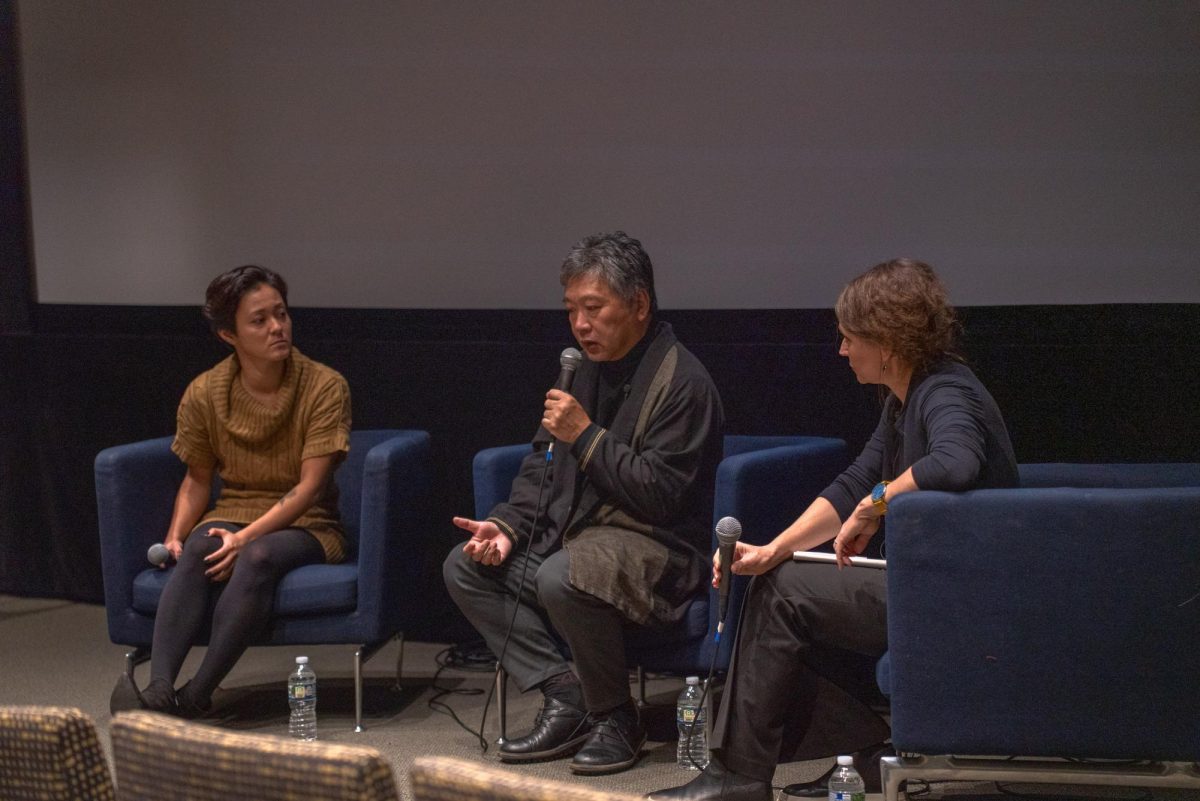On October 18, the Film Studies Center hosted a talk with award-winning Japanese filmmaker Hirokazu Kore-eda at the Reva and David Logan Center for the Arts. The discussion, which followed a screening of his latest film, Monster (2023), was moderated by cinema and media studies professor Maria Belodubrovskaya.
Over his 30-year-long career, Kore-eda has received many accolades for his work. His 2018 film Shoplifters won the 2018 Palme d’Or, the highest award at the Cannes Film Festival, as well as an Academy Award nomination for Best Foreign Language Film in 2019. At the 2023 Cannes Film Festival, Monster won the Queer Palm award.
During the talk, Kore-eda—with the help of a translator—and professor Belodubrovskaya discussed his career in filmmaking and the different artistic choices made in the film.
According to Kore-eda, he agreed to direct Monster before reading the script because of his admiration for the screenwriter, Yuji Sakamoto. The screenplay follows the story of a single mother who, concerned about her son’s strange behavior, demands that an elementary school teacher she suspects of abuse be fired. However, as the film continues, the audience learns about the teacher’s life and the son’s feelings for another boy, revealing a more complicated situation.
For Kore-eda, the process of making this particular film was very unique. “Usually, I don’t finish [writing] the script until we get [on set],” he said. “I audition the actors, and then I talk to them, and then I adjust the screenplay according to their personalities. However, this screenplay was already written, and actually the characters, their personalities, were very different from the actors that had been cast. And so we went through a very long process of rehearsals and study groups and learning more about things like LGBTQ and queerness, and really practicing with these actors. So that was a really new experience for me, and I learned a lot.”
As the conversation continued, Belodubrovskaya asked Kore-eda about the term “national cinema,” which, in film studies, seeks to understand films in the context of nation-states.
“I don’t think about making a Japanese film. I’ve made films in France, I’ve made films in Korea, and I don’t think I’m making French films or Korean films,” Kore-eda said. “There are moments when I deeply feel like, whether because I’m Japanese or because it is a personality [trait] of mine, that it just comes out and there’s something Japanese that, even if I’m not trying to convey it, is coming out. And that’s something that I’m still trying to understand, but know that it’s not something that I’m doing consciously.”
The director also spoke about how the film tackles gender and sexuality norms in Japan. Monster partially follows the story of Yori, an elementary school student who is bullied for being queer. “In Japanese society, it is still too common to say things like ‘make it up like men’ after a fight, and this resonated very violently for the boys [in the film],” Kore-eda said. “Most adults are not aware of the phenomenon. It’s too common to eliminate the things that don’t ‘fit,’ that are not considered normative. And so, in that way, that is the ‘monster.’”
This year, the Chicago International Film Festival gave Kore-eda a tribute and retrospective, awarding him the Career Achievement Award at the Gene Siskel Film Center on October 18.









